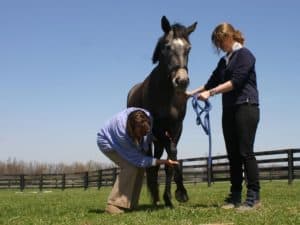Standardbreds Quickly Benefiting from New USTA Program
- Topics: Article
The U.S. Trotting Association (USTA) introduced its Support Our Standardbreds program earlier this month, and the organization is hard at work doing just that. USTA has already helped two horses in the three weeks since the program was introduced and has at least three more horses lined up for financial assistance, according to Ellen Harvey, executive director of harness racing communications.
Support Our Standardbreds (SOS) is a program designed to provide financial aid for the care of abused or neglected Standardbred horses. SOS started as an idea from Don Marine, one of USTA's directors and a former member of Maine’s legislature. Harvey said that Marine "had a very strong feeling that we needed to be doing more than we were doing to help our horses that fell into bad situations, for whatever reasons."
Turning a vague idea into reality, however, was not a simple process. Marine spent more than a year promoting his idea, and the board approved the $100,000 budget in late March of this year. USTA President Phil Langley then appointed a committee to decide how this money could best be used.
The board set guidelines for who could access the financial assistance. The funds are available only for animal control agencies authorized for legal custody of the horses because many animal control officers are limited greatly by their institutions' budgets or resources to care for a horse
Create a free account with TheHorse.com to view this content.
TheHorse.com is home to thousands of free articles about horse health care. In order to access some of our exclusive free content, you must be signed into TheHorse.com.
Start your free account today!
Already have an account?
and continue reading.
Written by:
Courtney LeMay, Editorial Intern
Related Articles
Stay on top of the most recent Horse Health news with












